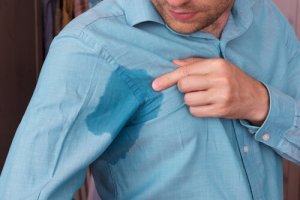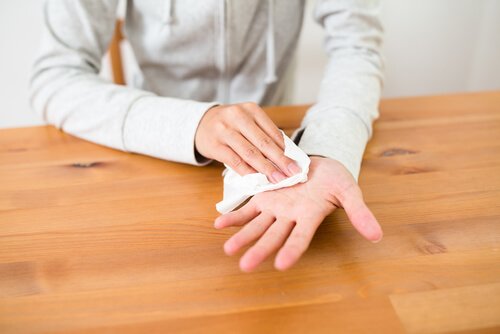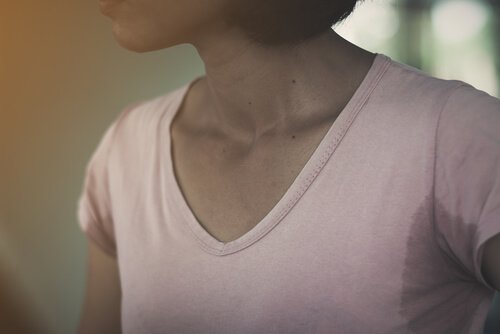Hyperhidrosis (Excessive Sweating) and Self-Esteem


Reviewed and approved by the psychologist Sergio De Dios González
Some people have a condition called hyperhidrosis (or excessive sweating) that almost always leads to embarrassment in social situations. Thus, it’s not surprising to hear that this excessive sweating problem could take a toll on people’s self-esteem.
This Spanish-language article says that hyperhidrosis causes people to sweat spontaneously. It isn’t related to temperature nor exercise.
Treatments for hyperhidrosis
The fact that this excessive sweating condition can play such a big role in a person’s daily life (both physically and mentally) and even affect self-esteem, sufferers may want to reduce the symptoms as much as possible.
Here are some things to keep in mind if you’re suffering from this condition:
- Go to the doctor because they can suggest some treatment options.
- Good hygiene. Whether your feet, hands, armpits, or other body parts sweat excessively due to this condition, good hygiene is essential to managing it. That means you need to shower more than normal. This will help prevent body odor and keep the sweating from affecting your self-esteem.
- Systemic medications. Your doctor should prescribe the best medication for you and track your progress to see whether they should up the dosage or reduce it. These medications are usually effective in mild cases.
- Surgery. You should only consider surgery if your condition is moderate or severe. If you can’t get surgery, there’s a new option that uses galvanic currents.
All of these are options can help keep your sweating under control. If the treatment you go for is effective, there’s no doubt that your self-esteem will improve in social situations.

Testimonials about excessive sweating and self-esteem
If the condition has had a big impact on your self-esteem, you might need to see a psychologist who can help you learn to accept your condition. If you need some inspiration, just look at David Broncano. He’s a stand-up comedian that makes fun of his hyperhidrosis on stage.
Some people with this condition find it more comfortable to go to a gym because everyone else is sweating too. Outside of that, though, they tend to feel insecure and small and some people even try to hide the problem from their own partners.
This is why it’s worth keeping in mind something a woman named Violeta said about her experience with hyperhidrosis: “The worst part isn’t the condition, it’s that your whole life revolves around it.”

An aesthetic issue?
The reason people’s self-esteem tends to be affected by excessive sweating is that we have a lot of societal beliefs about sweat. We associate it with “body odor,” “dirtiness,” and “lack of hygiene.”
However, sweating is natural. Although no one worries about it when they’re exercising, it tends to embarrass them in other situations because it’s just not socially accepted.
Luckily, surgery can completely eliminate the problem. If your case is mild, you can keep it under control with medication. Do you have hyperhidrosis? How has it affected your life?
All cited sources were thoroughly reviewed by our team to ensure their quality, reliability, currency, and validity. The bibliography of this article was considered reliable and of academic or scientific accuracy.
- Hernández Gutiérrez, José Manuel, Salinas Sedo, Gustavo, & Nodal Ortega, Josefina. (2011). Hiperhidrosis esencial, recomendaciones para su tratamiento. Revista Cubana de Cirugía, 50(4), 597-601. Recuperado en 23 de enero de 2019, de http://scielo.sld.cu/scielo.php?script=sci_arttext&pid=S0034-74932011000400023&lng=es&tlng=es.
- Hernández Gutiérrez, J. M. (2008). Simpatectomía videotoracoscópica para el tratamiento de la hiperhidrosis palmar moderada. Revista Cubana de Cirugía, 47(3), 0-0.
- Lorenzo, C. M., Moreno, B. E., Ríos, M. G., Fernández, M. F., Gutierrez, C. V., & Barrilao, R. G. (2004). Exploración y tratamiento fisioterapéutico de la hiperhidrosis palmar. Fisioterapia, 26(2), 105-113.
- Vialat Soto, Vivian, Vázquez Merayo, León Alonso, Dania, & López Díaz, Vivian de la Caridad. (2014). Sudor compensador, un efecto no deseado secundario al tratamiento quirúrgico de la hiperhidrosis primaria infantil. Revista Cubana de Pediatría, 86(2), 207-214. Recuperado en 23 de enero de 2019, de http://scielo.sld.cu/scielo.php?script=sci_arttext&pid=S0034-75312014000200009&lng=es&tlng=es.
This text is provided for informational purposes only and does not replace consultation with a professional. If in doubt, consult your specialist.








